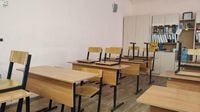In a significant shift for the education system in Russia, a new grading system focusing on student behavior is set to be introduced in schools, beginning in September 2025. The head of the Ministry of Education, Sergei Kravtsov, has confirmed that the new assessment will involve evaluating students not only on their academic achievements but also on their behavior in the classroom.
Kravtsov announced this potential change during a recent briefing, stating, "I do not rule out that this innovation will be implemented in a trial format. We do not intend to delay this decision; however, we need to carefully work through all aspects so that the new introduction truly brings benefit." This push for behavioral assessment aims to provide a more comprehensive understanding of students' overall performance in the educational environment.
The plan comes at the directive of President Vladimir Putin, who, on February 8, 2025, instructed the government to engage with educational professionals and parents on the proposed behavior grading system, emphasizing the importance of this assessment being comparable in weight to academic grades. Putin underscored the need for collaboration with various stakeholders to ensure that the system is well-executed and effective.
In light of these developments, Valery Fadeev, the Chairman of the Council for Human Rights, has proposed that students who receive unsatisfactory grades for their behavior should be barred from taking final state examinations. This suggestion highlights the serious implications that behavioral assessments may carry for students moving forward.
Moreover, the concept of grading behavior is not without precedent in Russian educational history. Such a system was in place as far back as 1943, when rules were established that assigned grades for conduct: a grade of '5' indicated impeccable behavior, while a '3' was given for serious violations, and a '2' was associated with considerations for potential expulsion from school. This historical context serves as a reminder of the complexities and challenges faced in evaluating student behavior alongside their academic performance.
As this new grading system heads toward implementation, Kravtsov has indicated that the Ministry of Education is keen on ensuring this educational innovation will genuinely benefit students and help foster improved behavior in school settings. Discussions surrounding the new grading criteria are ongoing, with a government report expected to be delivered by July 1, 2025, detailing the outcomes of community consultations. The Ministry aims to finalize the framework for this behavioral assessment before the school year begins.
This potential grading system has sparked a mixture of reactions among educators and parents. Some view it as a necessary step in addressing discipline and promoting a constructive learning environment, while others express concerns about the subjective nature of behavior evaluation and its possible impact on students' self-esteem.
While the detailed criteria for what constitutes acceptable behavior are still being developed, the intention is clear: to create a more holistic evaluation of student performance in schools. Educators stress that positive behavior is essential for effective learning and that grading this aspect should motivate students to improve not just academically but also in their interactions with peers and teachers.
As the Ministry proceeds with its deliberations, many are left reflecting on how such a change could reshape the educational landscape in Russia. The government is emphasizing the importance of a well-thought-out, collaborative approach to ensure that the grade will aid students in developing essential life skills alongside academic knowledge.
In conclusion, the introduction of behavior grading in Russian schools represents a significant change in how student performance is assessed. As authorities work to finalize these plans, the engagement of the educational community will be crucial in ensuring a balanced and effective system that truly supports student development.





